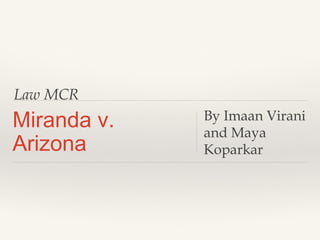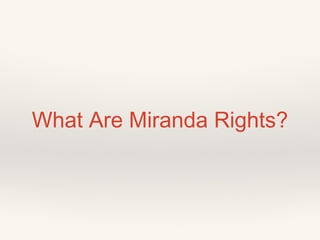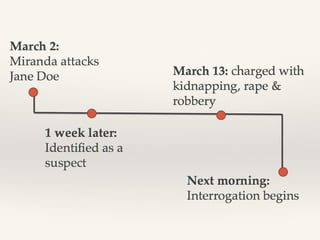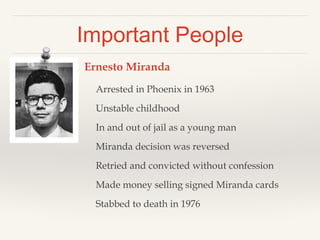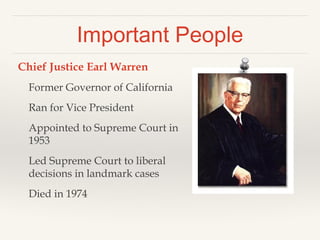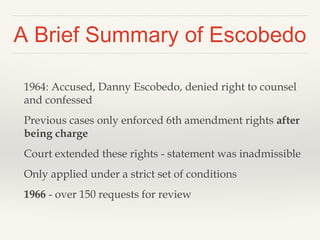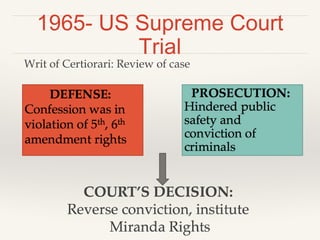Presentation on a Famous Legal Case: Miranda vs. Arizona
- 1. Law MCR Miranda v. Arizona By Imaan Virani and Maya Koparkar
- 2. Agenda History of the Crime and Police Investigation Important People in Case The Trial Legal Issue Impact on Society at the Time Place in Legal History
- 3. What Are Miranda Rights?
- 5. History of the Crime and Police Investigation
- 8. Important People in the Case
- 9. Important People Ernesto Miranda Arrested in Phoenix in 1963 Unstable childhood In and out of jail as a young man Miranda decision was reversed Retried and convicted without confession Made money selling signed Miranda cards Stabbed to death in 1976
- 10. Important People Chief Justice Earl Warren Former Governor of California Ran for Vice President Appointed to Supreme Court in 1953 Led Supreme Court to liberal decisions in landmark cases Died in 1974
- 11. Important People Michael Vignera Roy Allan Stewart Carl Calvin Westover Arrested for robbery and murder Sentenced to death Arrested for robbery Sentenced to 30 years in prison Arrested for first-degree robbery Sentenced to 30-60 years in prison REVERSED REVERSED REVERSED REVERSED UPHELD UPHELD
- 12. The Trial
- 14. A Brief Summary of Escobedo 1964: Accused, Danny Escobedo, denied right to counsel and confessed Previous cases only enforced 6th amendment rights after being charge Court extended these rights - statement was inadmissible Only applied under a strict set of conditions 1966 - over 150 requests for review
- 15. 1964- Arizona Supreme Court (Appeal) DEFENCE: Confession was involuntary and rights were not safeguarded Conviction was UPHELD
- 16. 1965- US Supreme Court Trial Writ of Certiorari: Review of case
- 17. Legal Issue
- 18. Is it necessary for a detained suspect to be aware of and understand their Fifth and Sixth Amendment Rights prior to questioning?
- 19. Does the police interrogation of an individual violate their Fifth and Sixth Amendment Rights if they are not notified of the rights given to them within these amendments?
- 20. Arriving at the Majority Opinion
- 22. Dissenting Opinion Written by Justice John Marshall Harlan Utopian concept of “voluntary” No physical/psychological brutality Miranda gave statement freely Proper procedures were followed
- 23. Impact on Society at the Time
- 24. Impact on Society at the Time Miranda Cards Changed the treatment of those arrested Police and investigators opposed practise Incidences of police brutality/abuse of power have decreased Section 3501
- 25. You have the right to remain silent.
- 26. Anything you say can and will be used against you in a court of law.
- 27. You have the right to talk to a lawyer and have present with you while being questioned.
- 28. If you cannot afford to hire a lawyer, one will be appointed to represent you before any questioning if you wish.
- 29. You can decide at any time to exercise these rights and not answer any questions or make any statements.
- 30. Place in Legal History
- 34. Miranda in the Future “…potential alternatives for protecting the privilege which might be devised by Congress or the States.”
- 35. Thank you for being a great audience! Up Next: Multiple Choice Questions

